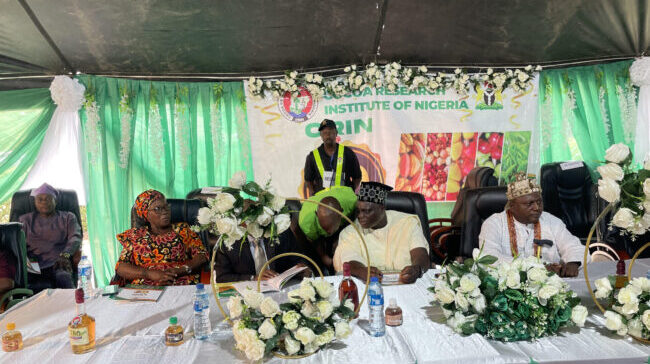The Minister of Agriculture and Food Security, Senator Abubakar Kyari, has revealed that the Cocoa Research Institute of Nigeria (CRIN) has made significant contributions to Nigeria’s Gross Domestic Product (GDP) over its 60 years of existence.
Senator Kyari, represented by the Zonal Director of the ministry, Olayinka Akeredolu, made this known during the 60th anniversary celebration of CRIN, held on Monday in Ibadan, Oyo State.

In her remarks, Akeredolu lauded the institute’s contributions to Nigeria’s agricultural development and encouraged the adoption of technological advancements to enhance research outputs and industrialisation.
“It is noteworthy that 60 years of existence is no mean achievement in the life of an institution, especially one whose contribution to numerous tree crops like cocoa, cashew, kola, coffee, and tea is evidently felt across the length and breadth of our country and beyond. Since its inception in 1964, CRIN has been a major player in contributing to the GDP of our nation.
“As the institute takes stock of 60 years of scientific research and looks to an even brighter future, it is our desire that the institute will harness the transformative power of technology to improve on research outcome delivery to the industries who rely on your great institute’s research outcomes for sectoral growth and development,” Akeredolu stated.
The event featured an award presentation, book launch, exhibition, and cultural displays, among other activities.
In his welcome address, CRIN’s Director/CEO, Dr Patrick Adebola, highlighted the institute’s achievements over the past six decades in the production of cocoa, cashew, kola, coffee, and tea. He reaffirmed the institute’s commitment to driving agricultural innovation, leveraging science and technology, and improving farmers’ livelihoods. He also announced CRIN’s readiness to embark on research into black plum.
“At CRIN, our research has transcended traditional crop development, venturing into innovative value addition. Our institute has added value to cocoa and created new products for local consumption and export. We have processed cocoa beans into various products such as chocolate, cocoa butter, cocoa powder, cocoa wine, choco bread, cocoa custard, soy chocolate, chocolate spread, and chocolate yoghurt, among others. Also, we have converted cocoa by-products into valuable products.
“We have successfully produced poultry feed from cocoa pod husk with 20% maize replacement. These innovations have provided additional income streams for farmers, supported small and medium enterprises, and contributed to the nation’s economic diversification,” Dr. Adebola said.
“The forward-looking, stylistically innovative works and aggressive developmental fund drive of the Institute have yielded significant dividends as the Institute partners with stakeholders to secure grants and awards, including a keenly contested $22 million award as an example.”
He pledged that “CRIN will continue to lead the charge in agricultural innovation, leveraging science and technology to enhance productivity, promote sustainability, and improve the livelihoods of farmers nationwide.
I am confident that the legacy we have built over the past 60 years will serve as a strong foundation for even greater achievements in the decades to come.”
The guest lecturer, Vice-Chancellor of Osun State University, Professor Odunayo Adebooye, represented by the Director of the Centre for Predegree Studies, Professor Onyegbula Nwoke, delivered a paper titled ‘Tree Crops Research for Development: Key to Nigeria’s Economic Diversification and Sustainability’.
In his lecture, Professor Adebooye explored how tree crop research can drive economic diversification, reduce dependency on oil, and promote food security, presenting it as a solution to Nigeria’s economic challenges and a step toward sustainable development.
According to him, “Cocoa, cashew, and kola nut are important tree crops that can bring huge economic benefits to the country. However, the country has witnessed a steady decline in the yield of these crops and in the quantity produced annually.
“In a nation with a large population and increasing rates of food insecurity, leveraging tree crops could provide a more resilient economic foundation, supporting both urban and rural communities. This strategy aligns with the government’s agenda to diversify the economy and reduce poverty. By advancing cultivation techniques, improving crop varieties, managing pests, and addressing the effects of climate change, tree crop research serves as a cornerstone of agricultural innovation and sustainability.”
Oyo State Governor Seyi Makinde, represented by the Special Adviser on Budget and Economic Planning, Simeon Oyeleye, tasked the leadership of CRIN with establishing a robust relationship with local government chairmen where the institute operates to foster cooperation with farmers.
The event was graced by directors-general of research institutes, past directors of CRIN, representatives of partner organisations and sustainability companies, academics, government officials, and traditional rulers.
READ MORE FROM: NIGERIAN TRIBUNE







